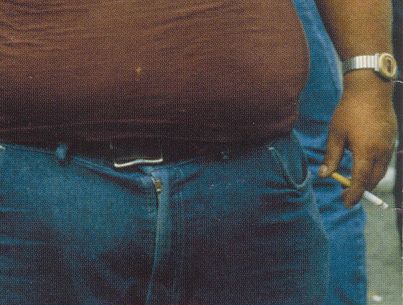|
|
|||||||||||||||||||||||||||||||
|
Smokeless Cigarettes
There is a new cigarette available in Ontario and its going to dramatically change the industry. It may even spell the end to traditional cancer-causing cigarettes. Imagine smoking without the smoke? Or the cancer? Or the horrible stench? Three Ontario entrepreneurs have created a smokeless and tobacco-free cigarette and are hoping to capitalize on the province wide smoking ban. The Revelle Prestige looks and acts like a cigarette without the harmful side effects, according to Rick Butera, one of the business owners in Leamington, Ontario. Called a "nicotine delivery device", it replicates the act of smoking using a nicotine cartridge, a microchip and a water-vapour mist. When the user inhales through the tip, the battery-driven chip activates an atomizer which creates a nicotine-flavoured water-vapour mist.
Rick Butera, who owns the Solarium Group with business partners Lisa Butera and Rachel Grover, said the local supply of the smokeless cigarettes "will be driven by demand and so far, there's been a great deal of interest wherever I've displayed the product." Butera recently acquired the Canadian distribution rights, although the patents are still held by manufacturers in China where the technology was developed. "They look and behave like cigarettes but with no smell, no dangers, no tobacco and no carcinogens," said Sherman Mohr, of the Momentum Group. The Tennessee-based company represents Revelle Co., which has the American rights to the product. Mohr acknowledges that, while nicotine "is not dangerous, it is addictive. Our product can be used as a smoking cessation device but most of our customers are interested in being able to continue smoking legally where there are bans." The cigarette itself costs about $175 and replacement cartridges, which last up to 2 1/2 weeks, sell for $5 (which means smokers will save money in the long run as well). The cigarettes come with four different cartridges to provide high, medium, low or no doses of nicotine so they are being touted as both a way to quit traditional smoking but also as a healthy and cheaper alternative to people who are just starting.
Mohr, who said he has researched a number of no-smoking bylaws and legislation, also said the product is completely legal since there's no tobacco used and nothing is lit while the product is being used. "I'd say there is about about four to five no-smoking bylaws going into effect every day across the U.S. at the local, county and state levels and to us, it sounds like cash registers going off," said Mohr. "This product allows bars, restaurants, casinos and other businesses where smoking is banned to retain loyal customers they would otherwise lose." Governments also stand to benefit from this new product because it means the government can move forward with complete bans on tobacco products, and thus save in the long run due to dropping health care costs (which will be a boon to health insurance companies). And what do we have to say about this new cigarette? We don't smoke and indeed despise the stench from smokers, but even we are giving it the thumbs up. Smells good to us.
Smoking makes people fatter: studyAUSTRALIA - Researchers say they have uncovered the truth behind one of the last excuses smokers had to keep puffing - that it keeps them slim. A study by a team from the universities of New South Wales and Melbourne has found a few cigarettes a day may actually result in the body storing too much fat, not less. In the research, published in the American Journal of Physiology, mice were exposed to cigarette smoke and fed either a low fat diet or a feast. The results show smoking mice might have eaten less but they still kept the kilograms. Professor of pharmacology at the University of New South Wales Margaret Morris says if it is true, humans who smoke are probably losing muscle and other precious organs, not fat. Over Eating People who smoke lose their taste buds and tend to eat more food in an effort to try and taste more of it. Plus the lack of taste causes the brain to receive less brain signals which confirms that the person is eating, causing them to eat more when their brain normally would have told them they aren't hungry any more. Because of lack of taste buds smokers also tend to eat more sugary foods because of the stronger and sweeter taste. This leads to the body storing that sugar.
Toxins Build Up In order to fight toxins your body stores energy reserves in the form of fat. Because of the multitude of toxins ingested while smoking people end up storing lots of fat in order to better combat the toxins infecting the body. Loss of Breathing/Exercise When you can't breathe properly you don't exercise for as long or as hard. Over time this results in less muscle and more fat in your body. Increased Appetite People who quit smoking and then complain that they have actually put on weight do so because of increased appetite. "So I think the message from this study is that using smoking to suppress body weight gain, if you're already overweight it is not going to be helpful." While the number of people smoking continues to fall, it has been tougher getting the message through to young women. Dr Morris says although young women might think they look slimmer, they are now being told it is actually muscle not fat they are losing. "Our work actually points out that this is a very powerful health message - if it's true in humans - that the combination of these two behaviours is very, very unhealthy," she said. Dr Morris says it is important for more research to be done. "It's very hard to do these studies in humans, clearly," she said. "This is a long-term study, we've fed the animals for seven weeks, the smoking was equivalent to moderate cigarette smoking in humans, we know that they had carboxyhaemoglobin levels in that range. "So, if we can make the leap into humans, yes, I think it is quite important."

Study: Weight gain after smokingQuitting smoking? It's definitely a step in the right direction towards improving your health. But make sure to watch your weight in the process or your lungs won't see all the benefits that come from butting out. "The overall effect of quitting smoking on lung function seems beneficial, but this effect could change over time if mean BMI continues to increase in the population," writes author Dr. Susan Chinn in the journal The Lancet. Chinn and her colleagues studied the effect of smoking habits and weight on lung function in more than 6,650 adults aged 20 to 44. When the study began, in the early 1990s, the researchers recorded the subjects' lung function, weight and height and questioned them on their smoking habits. Several years later, the researchers collected new information on the same criteria, along with data on participants' smoking habits between surveys, and analyzed the information to see how changes in smoking and weight affected lung function. All of the participants, on average, gained weight over the course of the study. But people who quit smoking gained the most (an average of 0.79 kg a year for men and 0.78 kg a year for women), while people who quit and restarted gained the least (0.28 kg a year for men and 0.22 kg for women). Men who never smoked gained an average of 0.57 kg a year, while women gained 0.53 kg. Overall, the participants all saw some degree of decline in lung function as a result of the aging process. But not surprisingly, people who had never smoked showed the least decline, while those who quit smoking showed a lesser degree of decline than those who continued to smoke. But once the researchers accounted for weight when looking at the rate of decline among former smokers, they found that weight gain cancelled out some of the benefit of quitting. "The relation of decline in lung function to increasing weight or BMI was substantially greater in men than in women," they noted. On average, weight gain diminished the benefits of quitting on lung function by 38% in men and 17% in women, the researchers found. But men who gained 1 kg a year showed zero benefit from quitting when it came to forced expiratory volume, a measure of lung function, while women had to gain 2.43 kg a year to lose the entire benefit of quitting. These results underscore the importance of controlling weight after quitting smoking, the researchers say. "Most behavioural weight-control interventions have been ineffective in the long term, but pharmacological interventions to promote smoking cessation also reduced weight gain," they note in their conclusion. "However, nicotine replacement therapy might only delay weight gain until it is stopped." In a separate editorial, which also appeared in The Lancet, Dr. Graham Colditz of Harvard Medical School notes that in spite of weight gain, the benefits of quitting smoking outweigh the risks. "The findings of Chinn and colleagues suggest that these health advantages could potentially be increased by weight control at the time of quitting," he writes, adding that doctors should emphasize exercise and plenty of support for patients who are trying to kick the habit.
|
|
||||||||||||||||||||||||||||||
|
Website Design + SEO by designSEO.ca ~ Owned + Edited by Suzanne MacNevin | |||||||||||||||||||||||||||||||





